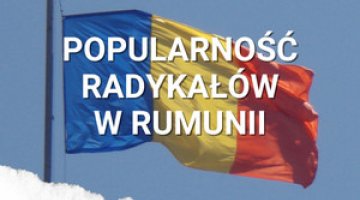The breakdown of political order in Romania
Last week saw an escalation in the conflict between President Traian Basescu and the Victor Ponta government which has been in power since May this year. On 6 July, the parliamentary majority led to the president being suspended from duty on charges of serious breaches of the constitution. This decision was preceded by sudden staff reshuffles and legislative and procedural changes which facilitated the president’s suspension from duty.The referendum concerning impeachment has been scheduled for 29 July. In the transitional period, the speaker of the Senate, Crin Antonescu, will be performing the duties of the president.
The manner in which President Basescu was removed from power has caused a serious crisis in Romania’s relations with the European Union and with its individual member states (above all Germany). They are accusing the present ruling team of breaching the principles of the rule of law, upsetting the checks and balances system, and undermining the independence of the judiciary. The Ponta cabinet has rejected these accusations, emphasising that the Constitutional Court confirmed on 9 July that the impeachment procedure was compliant with the constitution.
However, as a consequence of harsh criticism, the Ponta cabinet is giving up its initial idea to lift the requirement that the turnout at the referendum should be at least fifty per cent (the lack of this requirement would have de facto prejudged the impeachment of the unpopular president). The government hopes that it will be able to mobilise the anti-presidential electorate to take part in the vote, and thus its actions will gain public legitimacy and the government’s image in the EU arena would be improved. However, it cannot be ruled out that the impeachment will be unsuccessful and this would result in a further destabilisation on the internal political scene and a continuation of the bitter political conflict between the president and the government.
The immediate impeachment
The Ponta government, with support from the parliamentary majority, carried out a staff reshuffle and a number of legislative and procedural changes aimed at facilitating the procedure to suspend the president from duties in less than four days, between 3 and 6 July. The ombudsman and the speakers of both houses of parliament, who were linked to the opposition, were dismissed. The government also passed an emergency ordinance reducing the Constitutional Court’s rights in the presidential impeachment procedure (see Appendix). Since the decree was in effect, the Court’s negative evaluation of the parliamentary motion specifying the instances in which the president had reportedly breached the constitution, was not legally binding. The president was suspended from duties by a definite majority of votes on 6 July.
All the decisions passed by the government coalition have been challenged by the Democratic Liberal Party (PDL) – which is linked to the president – at the Constitutional Court. However, on 9 July, the court found unconstitutional only the emergency ordinance which limited its competences. Meanwhile, it confirmed that most of the changes had been made in compliance with the constitution and that the temporary takeover of the president’s duties by the speaker of the Senate was legal.
The causes of the conflict between the government and the president
The impeachment of President Basescu has been the key political objective of the Social-Liberal Union led by Victor Ponta which has been governing the country since May this year. This will allow this bloc to take over complete power in the country, to cement the government coalition and to detract attention away from a number of socio-economic problems.
The president was in fact the only political opponent and critic of the government; the opposition Democratic Liberal Party is weak and unable to compete with the government coalition in the upcoming parliamentary election (autumn 2012). Actions taken by Basescu, who made efforts to draw attention to each error of this government, could reduce the scale of the Social-Liberal Union’s victory (its current support level stands at 50%). The president firmly insisted on the dismissal of the prime minister, who had been accused of plagiarism in his PhD thesis by the commission for the recognition of diplomas. Furthermore, he accused Prime Minister Ponta of violating the constitutional order in connection with his participation in an EU summit. The prime minister disregarded the Constitutional Court’s decision, according to which the representation of Romania during EU summits was among the competences of the president.
Secondly, the anti-presidential rhetoric has made it possible for the government to capitalise on public dissatisfaction (the president is very unpopular). It has also been strengthening the co-operation and unity within the Social-Liberal Union coalition and offers a greater chance of victory in the election. The coalition is formed by parties whose respective political manifestos are very different: the post-Communist Social Democratic Party led by Prime Minister Ponta, the centrist National Liberal Party, and the Conservative Party. The only thing they have in common is their desire for the president to be impeached. Prime Minister Ponta has been under strong pressure from his coalition partner, the National Liberal Party (PNL), which realises that it has small influence on how the country is governed and demands that its leader, Crin Antonescu, should be chosen as president. The impeachment of the president has also been demanded by the smallest member in the Social-Liberal Union coalition, the Conservative Party (PC). It is speculated that this is mainly a consequence of investigations being conducted against some MPs representing this party and people connected with them. Given the approaching term set for nominations of the heads of the key anti-corruption agencies, which is among the presidential prerogatives, members of the Conservative Party may find a situation in which the president is impeached convenient because the investigations against them could be delayed or halted.
Possible future developments
The rules which will be applied to the referendum concerning the impeachment of the president will decide on the further development of the internal situation and on Romania’s relations with the EU. The Ponta government lifted the 50 per cent turnout requirement for the referendum to be binding, which would de facto make the impeachment of the unpopular president a foregone conclusion. However, since Romania has been sharply criticised on the EU forum, the government has announced that the 50 per cent turnout requirement will be imposed again. This offers President Basescu the opportunity to regain office. If the impeachment is unsuccessful, a further destabilisation on the internal political scene and a continuation of the bitter political conflict between the president and the government should be expected. If the president is removed from power, we should expect to see a further consolidation within the ruling camp, the polarisation of the political scene and a slowdown in combating corruption as the likely consequences.
Whichever way the situation develops on the internal political scene, Romania’s relations with the European Union have already been affected. During the political crisis, the European Commission and some member states, Germany in particular, voiced their concern about the condition of the rule of law and the independence of the judiciary in Romania. Some European politicians and a greater part of Western public opinion have reiterated the Romanian opposition’s accusations that the government had staged a constitutional coup in Romania. This will certainly adversely affect Bucharest’s perspectives of joining the Schengen Area, since another report evaluating the progress in combating corruption and the reform of the judiciary is expected this July as part of the Co-operation and Verification Mechanism. Some EU member states are making their consent to the enlargement of the Schengen Area dependent on progress made in these areas.
Appendix
Chronology of events during the political crisis in Romania
27 June – the Constitutional Court passes a decision stating that the president has the right to represent the country at meetings of the European Council, Court also ruled that the law on the uninominal vote, which was introduced by USL in May, is fully unconstitutional
28–29 June – Prime Minister Victor Ponta disregards the Constitutional Court’s decision, and President Traian Basescu states that he is being prevented from carrying out his constitutional obligations
3 July – the ombudsman and the speakers of both houses of parliament, who are linked to the opposition, are dismissed during an emergency parliamentary session (the speaker of the Senate performs the obligations of the president when the president is suspended)
4 July – the emergency ordinance depriving the Constitutional Court of the right to pass decisions concerning the constitutionality of parliamentary resolutions is passed by Victor Ponta’s government. In the Romanian legal system, the government has the right to pass ordinances between parliamentary sessions. Such ordinances must be later approved at the next session of parliament. In the transitional period, the right to contest ordinances in front of the Constitutional Court is vested only in the ombudsman.
5 July – the government passes the emergency ordinance amending the legal regulations pertaining to referenda. Ordinance introduced the rule that President can be dismissed by a vote of half plus one of those who go to the ballots (previous government introduced the rule that President can be dismissed by a vote of half plus one of the people on the electoral list). Ordinance lifts also the requirement for the 50% turnout in the referendum. );
the parliament votes for the impeachment of the president at an emergency parliamentary session. The key charges are: interference with the independent decisions of the judiciary, upsetting the balance of powers and the deterioration of living standards for citizens.
6 July – the Constitutional Court passes its opinion on the motion for the president to be suspended from duty. This contains no clear statement that the president has breached the constitution; the motion for the president to be suspended from duty is passed as a result of a vote at an emergency session in parliament;.
9–10 July – the Constitutional Court issues the opinion, according to which participation of 50% of the voters is necessary for the referendum to be binding; it calls into question the constitutionality of the ordinance restricting the competences of the court and deems legal the replacements of the ombudsman and the parliamentary speakers as well as the temporary assumption of the president’s duties by Crin Antonescu.
11 July – Prime Minister Ponta asks Parliament to call extraordinary sitting to amend referendum legislation according to opinion of Constitutional Court (the 50% turnout requirement).




